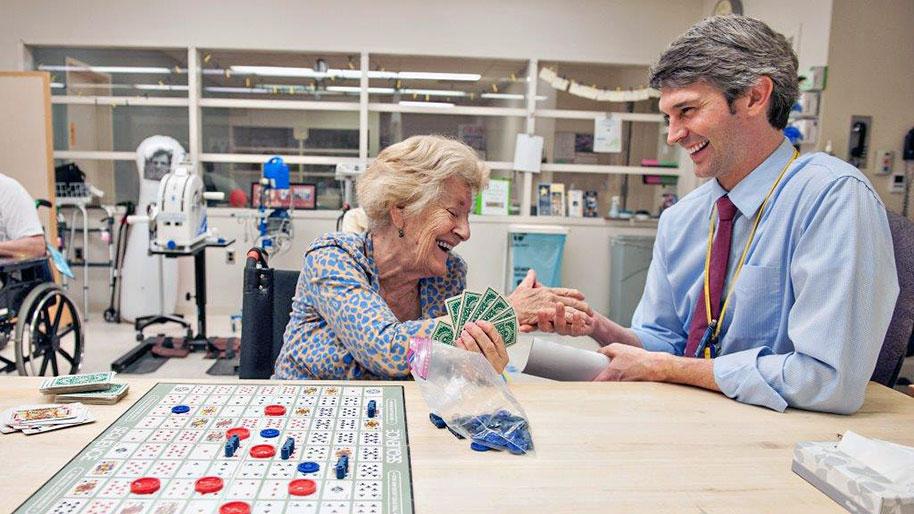MichiganMed_C_STROKEMONTH_Support1.jpg

Edward. S. Claflin, M.D., a physical medicine and rehabilitation physician, talks about the what, when, where and why of rehabilitation after stroke. Learn more on the Michigan Health Blog.
A stroke can cause injury to your brain, including impairment of motor skills, such as lifting your arm or moving your leg, speech issues and cognitive function. Comprehensive rehabilitation can help you regain function and skills so you can get back to your life. At the Stroke Rehabilitation Program, our multidisciplinary team of experts utilize a variety of therapeutic interventions to help you recover from a stroke and prevent a future stroke.
What’s exciting is that the brain can reorganize itself. It can relearn and repair. This is known as neuroplasticity. When a part of the brain stops working due to stroke, we have to teach it how to reroute. For example, if you want to get groceries and come to a block in the road, turning around and going home won’t get you your groceries; you have to find an alternate route. We teach the brain in the same way – finding an alternate route to lift your hand, read, take a step, etc. Through research we know that the brain is most pliable to grow right after birth and also after injury. After an injury, the brain sends all the appropriate cells and chemicals needed for the repair. The therapist teaches the nervous system what to do with it. But you have to use it or lose it. If you continue to work on your skills, the brain can continue to repair and relearn infinitely.
Stroke Rehabilitation Services
We offer a variety of services for people who have had strokes, including:
- Occupational therapy – to build your skills for daily living, such as dressing, eating and bathing
- Physical therapy – for building strength, improving balance and coordination
- Speech-language therapy – for language skills and swallowing
- Recreational therapy – to work on activities that you enjoy
- Neuropsychology - to help with any emotional or behavioral issues
- Medication management
- Orthotics – for people who require a wheelchair, walker, brace, etc.
- Social Worker services
Not everyone who has a stroke requires inpatient rehabilitation. For people who have had transient ischemic attacks (TIAs), or mini strokes, their deficit might only last for 24 hours. Some people can have a slight stroke where the deficit lasts just a few days. These people might have some difficulties, but nothing so severe that they need inpatient rehabilitation. This group of people is able to go home once they are stable and then go to outpatient rehabilitation if needed.
For patients with inpatient rehabilitation needs, U-M Health has partnered with Chelsea Hospital to provide stroke rehabilitation care in the most appropriate setting. Patients will have continued access to our high level of medical expertise along with the dedicated, interdisciplinary team of skilled professionals to maximize functionality.
In an inpatient setting, we provide nursing care, management of medical needs, and work on skills for daily living. We provide neurological re-education for balance, along with visual and cognitive processing. We also use advanced technology to help patients having trouble walking. We offer a technology called unweighting, which incorporates a support system from the ceiling to hold up patients so the therapist can assist them in taking steps without any fear of falling or injury. This allows them to work on their walking skills at a higher level. We also have one of the few Lokomat robotic gait-training systems in the state that moves the legs and feet for patients.
From day 1 following a stroke, our board certified clinical specialists and teams of therapists work in the dedicated acute stroke unit to educate patients and families how to minimize learned non-use from occurring in the first place and begin the rehabilitation process.
Inpatient rehabilitation has a minimum of three hours of intensive therapy every day seven days a week. If patients can’t tolerate that pace, they can go to an extended care facility where they can work at a slower pace for a longer duration. Inpatient therapy generally lasts 1-3 weeks.
Outpatient rehabilitation mostly focuses on progressing mobility and advancing strength, endurance and speed of walking, helping you to be as independent as possible. In addition, we utilize constraint-induced therapy to help patients improve their weaker side by what is known as forced use. This therapy encourages strength training and activities for the weaker side.
We also work with you on preventing a future stroke, ensuring you are taking your medications and making the necessary lifestyle changes. Dieticians are available to help you make better nutritional choices.
Everyone recovers to different levels at different paces. One person can be completely recovered in two to three months, while some could take a year and still have things to work on, such as strength and endurance. For many, rehabilitation is a lifelong process.
Make an Appointment
For appointments with our physicians or more information about our clinics, please contact our call center at 734-936-7175 or visit our Make an Appointment with Rehabilitation Medicine page.

